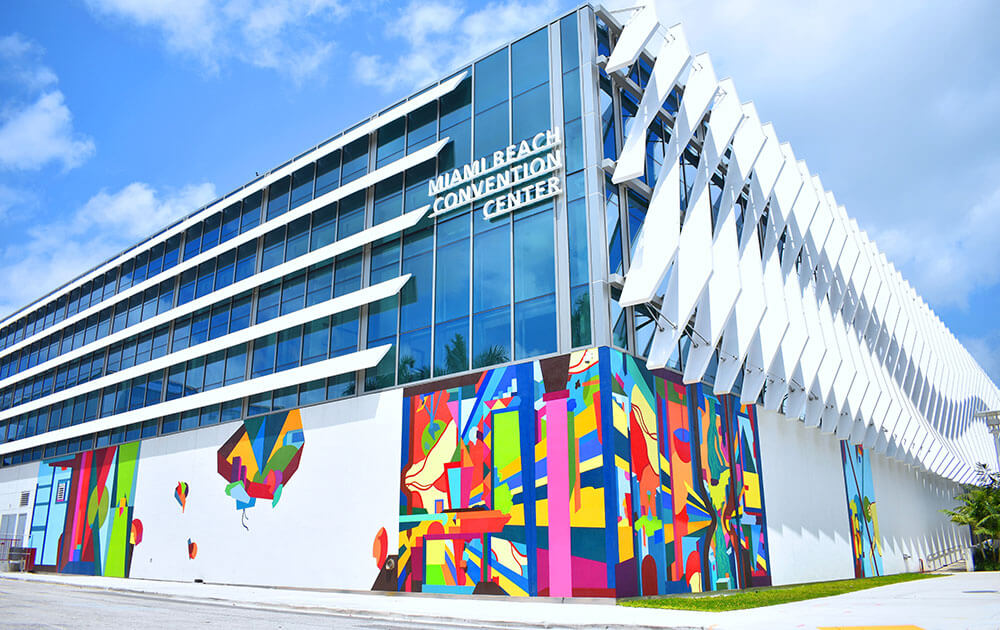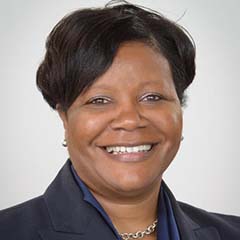
The Miami Beach Convention Center is managed by OVG360, a division of the Oak View Group dedicated to full-service venue management and event programming for arenas, theaters, convention centers, and amphitheaters throughout the U.S.
When Joyce Leveston, CMM, CVP, looks back on her 33-yearlong career working in convention centers, she credits the positive impacts of mentorship as a key component to her success. “I started in this business watching them build the San Diego Convention Center from the ground up,” said Leveston, who now serves as senior vice president of convention centers for OVG360, a division of the Oak View Group dedicated to full-service venue management and event programming for arenas, theaters, convention centers, and amphitheaters throughout the U.S. “I ended up being the 92nd employee, a telephone operator, and worked my way up through event management over 16 years in that city, all because I believed in the vision and had the right people lighting my path.”
Throughout this series highlighting women executives in facility management, many, like Leveston, have acknowledged the important work of leaders who came before them, and amid a growing talent crisis (look for our August 2022 cover story for more on this), they say mentorship will play a more important role than ever in cultivating emerging talent.
In fact, that’s Leveston’s parting advice for young people starting their careers: Seek out a mentor. “Look for a mentor that inspires you,” she said. “Be a subject matter expert at whatever you do (be amazing), and always be willing to learn new things and adjust your thinking. This will allow you to follow your passion, look for your purpose, excel at your greatest gift, and make room for others.”

People don’t just want to work for you, they want and need to have purpose. And the generational shift is certainly one that connects with humanity outside the office space. ”
Are you finding it more challenging than in years past to attract and retain talent, and if so, have you found any creative solutions that have helped remedy the situation? Are you experiencing high turnover or lack of staffing issues among the clients you work with and/or the companies in your supply chain?
Like a lot of the world, The Great Resignation is having an impact on the hospitality industry, specifically, and yes, I would say venue management facilities are certainly feeling the punch. The Oak View Group (OVG360) is certainly part of that equation. We, like many companies, are having our fair share of challenges in the recruitment and retaining of talent and, although COVID certainly exacerbated the situation one-hundred-fold, we have known for many years prior to the pandemic that we were facing a “war on talent” in our industry.
We can look at many factors that have contributed to how we as an industry were not preparing ourselves for the future of change. We have not been properly preparing for a change in this generational shift — Baby Boomers exiting the workforce; Millennial and Gen Z entering the workforce — and how we would need to adjust, adapt, and plan for this shift in culture and ideology. The use of technology is another place where we are feeling the gap, in how it would create such a cosmic shift, almost like how the earth plates shift during an earthquake. We thought we could take our time and slow-walk our way through. We knew that it could happen, but we weren’t expecting the unexpected rush and sequence of events, such as a pandemic.
So, when you ask if OVG360 is experiencing this shift, the answer is most notably yes. We are seeing this across our company from front-line staffing to management, and the areas most impacted are food service, marketing, finance, and HR. The ability for many of these skillsets to cross over to other industries have challenged us to be more flexible in our more traditional offerings. We have increased benefits, expanded PTO, allowed for flexible work schedules, created employee resource groups to develop more participation in workplace morale, and increased our community resource giving and participation. You see, people don’t just want to work for you, they want and need to have purpose. And the generational shift is certainly one that connects with humanity outside the office space.
Do you continue to experience challenges from disruptions in the supply chain and the steady increase in inflation? Has it gotten better or worse recently? Have you found any creative solutions that have helped offset that volatility?
The supply chain disruptions happened early on during the pandemic. Like many people, we thought we could speed up capital projects while we waited out COVID and that our venues would be ready for the resurgence. Well, like the rest of the world, we began to experience kinks in our supply chain and the costly impact of what that would mean to our business. As we re-emerge from COVID, we have found creative ways to deal with supply-chain issues such as sourcing locally and planning ahead on orders when we anticipate a larger event. We change menus as needed based on what is available and we communicate with our clients early and often, so they understand what needs to happen in advance — no surprises.
There are times when products and services, due to inflation, will hit our bottom line. That means an increase in cost to our clients and customers. Sometimes we share in this cost and sometimes we must pass it on. In all cases, we look for more suitable solutions, but yes, cost of goods, inflation, and cost of living is a reality in our world today. Even when it comes to how we compensate our staff. Knowing many of our teams did not qualify for incentive pay in 2020, we made a conscious decision to provide cost-of-living increases to try to provide some level of balance during these times in 2022. We know that we must take care of our most valued asset — our team — and that isn’t a hard sell to our clients.
The meetings and events industry has taken many twists and turns over the last two years. Can you talk about how you have weathered that personally and from a leadership perspective? Are there ways in which you find thinking differently as a result of the ongoing challenges to the meetings industry?
What I know about our industry is that if we are nothing [else], we are resilient. We are strong fighters and we come together during a crisis. We lean in and we look for solutions. During these past few years, I found myself on leadership calls with other venue leaders to support the industry and bring everyone together. The collaboration and teamwork were amazing.
In order to allow us to become a better industry, we had to set aside our competitive spirit, and work together for the greater good. Sharing ideas, what was working in one venue and what wasn’t, trusting our instincts and having mutual respect. This, I believe, will lead to emerging new leaders that I expect to see highlighted in our new future. It allowed us to address topics, create new best practices, partner with scientists on health and safety protocols, and highlighted our economic power and strength on a global level to the federal government and the world. We may not have all been in the same boat, but we certainly were all in the same storm. There is no doubt that I think differently today because of this experience. I certainly believe I am a better leader and have more empathy and compassion than I had going into this storm. As a leader, I am most grateful for all the lessons learned and gems acquired.
What’s the best piece of advice you were given in your career journey? Worst?
I would say I have had some amazing mentors along my journey. Some of the best advice I was given was, trust your gut instinct, and stay true to your authentic self — people will know the difference. To always leave the place better than how you found it, and lastly, when someone tries to poke at you, remember: “Small things to a giant” — you have bigger things to do.
The worst advice? I’m not sure that this was advice necessarily, but I was once told that I was too close to the people I managed, and to not overshare my knowledge. Clearly that person didn’t know the real Joyce because I am but a seed, designed to grow and leave much behind.
If you had a chance to do it all over again, is there anything you would change in how you prepared for this career — i.e., chose a different major, applied for more internships, found a mentor earlier, etc.? And do you have any advice for young people facing those decisions right now?
I would say that my journey was one of purpose and intentionality. It was not of my doing, so I can’t take credit for the steps or the path. I was given a vision to be a part of something bigger than myself. My mentors were handcrafted by God and placed at my feet as a light to my path. I am blessed beyond measure to have been in the right place and given the right vision to exceed for the right reasons.
In 1985, I was brought to San Diego and exposed to the world beyond Cincinnati, Ohio, where I was born and raised. I majored in communication at the University of California San Diego and was offered a full fellowship to the University of California, Irvine, to get my Ph.D., which I turned down because I wanted to work at the San Diego Convention Center and meet all the amazing people who would visit the city. I never had an internship — although I highly recommend it; I never looked for a mentor — although I was blessed to have been given many; and I never had a plan — although I would not suggest that to anyone. People saw things in me I never saw in myself, and they opened doors for me I couldn’t have imagined.
Jennifer N. Dienst is senior editor at Convene. This interview has been edited for brevity.
